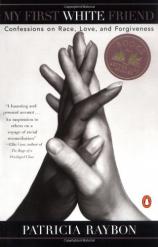Reading Group Guide
Discussion Questions
My First White Friend: Confessions on Race, Love and Forgiveness

1. "White people...had done unspeakable things. These are the things I was taught. I had heard them in childhood, at the knees of people I loved. In time I couldn't hate white people enough." Raybon makes an important point about how hate becomes "justifiable," even "noble" when we learn it from important people in our lives, perhaps even our parents. It took her forty years to realize she could overcome what she had learned from family and friends and forge a new outlook based on her own experiences. Discuss what may have appeared normal to you in your family as a child that in your adult years you realized was wrong. How did you come to that realization? Did your parents teach you to hate any one group? Why did it take Raybon half her life to get to a point where she could relinquish her past and replace hate with love?
2. The difference between Raybon's mother and father is striking. Raybon's mother was a forgiving, nurturing person who took most everyday racial indignities in stride. Raybon's father, although sometimes unforgiving of white people, had faith. He was a pioneer, and he believed in himself. How do you think each parent influenced their daughter? Discuss the differences in the way these two people grew up: the father, poor and motherless in Mississippi; the mother from a working-class and secure black family. What are Raybon's views about the important role the family plays in love, self-esteem, and forgiveness? Would you say that both the mother and the father are survivors? How so?
3. In 1958 at the pool, a lighter-skinned black girl turns to Raybon and remarks, "You're kind of dark, Patricia." Like a mantra, these words repeat in her head. The impact is powerful. She writes, "I don't know how to transform myself. And in 1958, the truth is that I am ugly. The world says it's so. And I can't change any of that." Why was this comment a turning point for Raybon? What did it say about the pressures she and her peers felt to conform to white images of beauty? Compare Raybon's feelings as an "ugly" black nine-year-old with her self-image in the chapter "The Affirmation."
4. "Forgiveness, for all its moral gloss, starts in a church." Do you think Raybon could have come to the decision to forgive if religion had not been a part of her life? Discuss how the black church was a haven for her.
5. Kerry Monroe is remembered as "the white avenging angel for doing what was right. For going. For reaching. For risking and trying." Looking back, the author is amazed at how pure Monroe's intentions were. "We are skeptical of kindness so unfailing, sympathy so instant," she writes, quoting Wallace Stegner. How important was Monroe to the author's process of forgiveness? Was the memory of this one episode a turning point for Raybon, or was the event meaningful only in retrospect?
6. King and Gandhi both explore the duality of hate: If I hate myself, I can't love others; if I hate others, I can't love myself. Do you think this is true? Why is this concept at the heart of Raybon's transformation?
7. By tracing three generations of a black family in America, Raybon outlines the racism that she, her parents, and her grandparents have faced. In the 1920s it was cotton fields, lynchings, and the KKK. In the 1950s it was Jim Crow laws, segregated housing, and separate public facilities. What are the racial hotpots today? How has the language changed, become more subtle?
My First White Friend: Confessions on Race, Love and Forgiveness
- Publication Date: June 1, 1997
- Paperback: 256 pages
- Publisher: Penguin (Non-Classics)
- ISBN-10: 0140244360
- ISBN-13: 9780140244366







